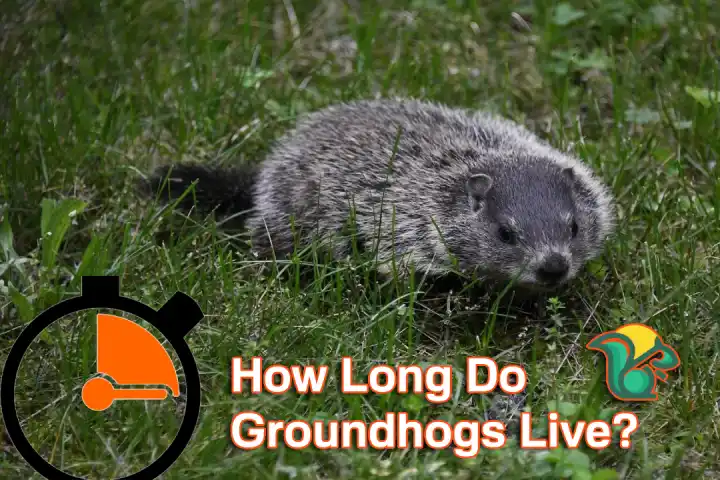How Long Do Groundhogs Live- The Lifespan of a Groundhog!
Cute and tiny rodents like groundhogs are very soothing to look at. But sadly, they don’t live for long! Well, this can make you sad, we accept. However, if you are planning to hold it captive, things can turn a little more interesting! How long do groundhogs live- both in the wild and captive- let’s learn about it from tip to toe!
The usual lifespan of a wild groundhog, also known as a woodchuck, is between four and five years, although they may live as long as six years. They have been known to survive for 10 years or more when kept in captivity.

How Many Years Do Groundhogs Typically Live?
The lifetime of a groundhog is estimated to be three years on average. Their vulnerability to being eaten by predators like coyotes, foxes, bobcats, hawks, owls, and even domesticated animals like cats and dogs contributes, at least in part, to their short lifetime (e.g., dogs).

In fact, groundhogs have a sluggish rate of movement, and as they are common in suburban areas, they are often run over and killed by automobiles. During their age of 2 years, groundhogs become sexually mature and begin reproducing.
After the end of hibernation, which may occur anywhere from January to March depending on the region and the average temperature of the surrounding environment, the breeding season begins. A single groundhog litter is born to each female groundhog once every year, and the gestation period lasts for around thirty days on average.
The female groundhog is capable of giving birth to up to five young at once. A two-month-old puppy may be ready to go out on its own to claim its territory.
In the wild, groundhogs typically live between three and five years. This number increases for groundhogs kept in captivity, which are also referred to as woodchucks or whistle pigs.

The typical lifespan of a groundhog kept in captivity is considerably over 10 years and is probably closer to 15 years.
Numerous groundhogs living in captivity live for a great deal more than wild groundhogs.

Regardless of whether you find groundhogs cute and cuddly or resent them for digging a hole in your lawn, their lifestyles are rather fascinating. Their ability to warn other groundhogs of potential danger by whistling through their teeth ensures their safety more frequently than you may expect.
Where do Groundhogs Live?
Groundhogs are usually found in North America. More specifically, you can get them from Alabama to Alaska. Well, now that you know how long they live, you might want to know where they spend all these years of their lives!
As humans think 70-80 years is a long time, for these cuties, 3-6 years is a long time too. In these years, they have to struggle a lot because they do not live in houses like you and us. But with a surprise, they do live in houses! Yes, we all know that they have holes and burrows to live. However, the ways they live inside the holes make it a house already.
The burrows they make can be eight feet long and can get 66 feet long in some cases too. The best part is they have floors inside the burrows which make it exactly like the houses that humans build. Also, some groundhogs are clever enough to make more than one burrow.
Yes, a coterie of groundhogs might look pretty and all but they are clever to ruin your garden, we assure you! Oh, you don’t know what a “coterie” is? Guess what is a group of groundhogs called? Yes, yes!
The lifespan of a Groundhog
The lifespan of a groundhog is different in the wild and in the captive. Let’s know about both of them!
How long do Groundhogs Live in the Wild
Groundhogs are little animals just like rats. So, you don’t expect them to live for 80 years like a human, right? Yes, just like their size, their lifespan is short too. These animals live in the wild, mostly inside the burrows.
On average, a groundhog can live more or less three years. However, in some cases, groundhogs are seen capable of living more than three years. It may last six years in times if the weather fits them or they have a comfortable livelihood.
So, if you count the average lifespan, they can live up to three years to six years or close. In this case, it’s necessary to keep in mind that they hibernate in the winter. The hibernation period is from October to February or November to March or close.
Eventually, every year, they hibernate for 5 months or so. From this, you can say that half of their lives, they sleep or hibernate! They get to enjoy their lives for 1.5 years to 3 years if you subtract the hibernating part.
How Long Do Groundhogs Live in Captive?
So, we already know that groundhogs can live more or less 3 years to 6 years in the wild. As they live in the burrows and the wild, this is how their average lifespan is counted. However, have you ever planned to get a groundhog as a pet and domesticate them?
On that note, groundhogs are not domestic animals and it is tough to make them be so. However, if they are held captive, things can be a little different. Yes, this can affect their lifespan too! When they can only live for three years to six years in the wild, while held captive, they can live more than this.
At times, groundhogs are seen living for 10 years. And if they are cared for properly and treated well, your woodchuck may be living more or less 14 years in captivity! Isn’t that amazing news?
Captive vs. Wildlife: Lifespan of a Groundhog
So, as you can see, the groundhogs can live a longer life if they are held captive and they are not in the wild. But why will they get a longer lifespan while held captive? Just like your skin requires care, the groundhogs require care too! But as they live alone, they usually do not get the chance of care!
- In the wild, the tiny rodents face natural disasters. As they are tiny, they cannot tolerate natural disasters. And this is why they get into hibernation as soon as the winter comes! So, we should mention that they are not much tolerant of extreme temperatures. This is one reason for their early death.
- In terms of physical strength, we can simply denote that they are weak. Along with this, another reason that can affect their lifespan in the wild is the deadly diseases. They are the natural carriers of some microbial communities that are harmful. For being the carriers of these diseases, they can get killed too!
- When the groundhogs are held captive, they are given necessary medications. These days, medical technology is improving a lot and these advancements can be used for the groundhogs. As woodchucks are prone to lung failure or kidney failures, with medical advancements, you can make them better. This can be another reason for them to live long in captivity while dying soon in the wild.
Do groundhogs live alone?
The woodchucks might look like little cute characters and they might be physically weak but in the heart, they are stronger than a lot of other animals. And you can already guess they are the solo performers on the stage.
These solitary creatures live alone in their dents. They eat alone, sleep alone and search for their food alone! For them, socialization is a no-no already. But, how can they make baby groundhogs if they stay alone forever? Well, that’s the key!
They only socialize or meet when they mate! After they mate, the kids stay with them for 3 months max and then leave to dig their burrows, because they are almost adults when they are three months old! So, when you ask-do groundhogs live in groups, NO, they don’t!
However, there are times when they need to protect each other. These are the times when they get together too! For communication, they use high-pitched shrills and with these, they warm each other regarding the approaching threats.
Do Groundhogs come back Every Year?
In their 3-6 years of lifespan, they will always prefer to live in the wild and forested areas. If you see the groundhog coming back every year from their den after you have thought it is dead, they were just hibernating!
The World’s Oldest and Most Well-Known Groundhogs
Some captive groundhogs live to be considerably older than their wild counterparts, even though this is not the norm for the species. Among the oldest groundhogs on record are listed here.
Punxsutawney Phil, who lives in Pennsylvania, is claimed to be at least 100 years old and is often regarded as the most well-known groundhog in the world. There is no evidence supporting the Pennsylvania Club’s assertion that he is close to 130 years old. The typical life expectancy of a woodchuck makes this very implausible.
Bob Will is responsible for rescuing and rehabilitating Dunkirk Dave, the groundhog. It seems that, like Punxsutawney Phil, Bob has relied on groundhogs for years to forecast the weather. The website’s vagueness notwithstanding, Dunkirk Dave might be as old as 58.
Staten Island Chuck, called Charles C. Hogg, is a reputable weather forecasting woodchuck. He is almost 40 years old, resides in the Staten Island Zoo, and has been doing weather reports since 1981.
Although he had been dead for over a decade (2019), Chattanooga Chuck was well admired for his accurate weather forecasts on his local news station. He received excellent treatment, and the news of his death was deeply felt across his neighborhood.
Buckeye Chuck from Ohio is another well-known groundhog who can foretell the future. In Ohio, woodchucks have been known as Buckeye Chuck since at least the 1970s.
Ohio has come clean and admitted that the current Buckeye Chuck isn’t the same one from the era, but all Buckeye Chucks spend their entire lives in adoring captivity.
Frequently Asked Questions
1. Can Groundhogs Live For 100 Years?
In the town of Wiarton, in the Canadian province of Ontario, there was an animal known as “Wiarton Willie” that survived for an incredible 22 years in captivity. Punxsutawney Phil is the equivalent of Willie in the United States (from Pennsylvania). According to the locals who live in and around Punxsutawney, the town’s namesake groundhog, Phil, is over a century old.
2. Why Do Groundhogs Have Short Lifespans?
Because of their vulnerability to predators, they tend to have a short lifetime (e.g., dogs). As an added insult, groundhogs are sluggish on their feet and are often found in suburban areas, making them easy targets for passing vehicles.
3. What Happens When a Groundhog Dies?
There are already a number of outlandish hypotheses that are being discussed on Reddit, one of which argues that the death of the groundhog is a “indicator of collapse,” meaning that something unfavorable may occur very soon. As the customary ritual did not take place, some people are under the impression that winter would continue for an additional six months.
5. How Old Is the Longest Living Groundhog?
One of the legends about Punxsutawney Phil is that the groundhog is eternal and has been carrying out the annual weather prediction routine since 1887. Bill Deeley, president of the Groundhog Club, claims that Phil has been around since the tradition’s inception in 1887, making him 135 years old.
Wrap Up
Now you know “How long do groundhogs live- the lifespan of a groundhog!”.
So, you already know how long the groundhog of your yard will live and how they live! We have also explained how you can keep a groundhog captive and increase its lifespan. Don’t forget that they live alone and this is why they need to act smart! Though they are weak, they are not easy to get into your hands! If you plan to catch it or get rid of it, you must act wisely!




